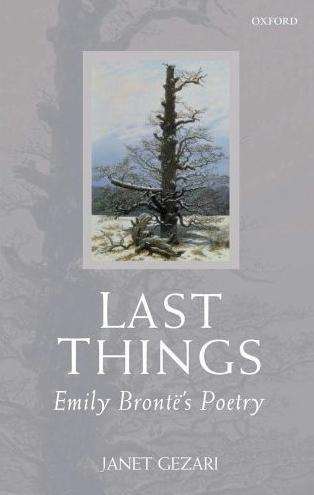 Oxford University Press kindly sent us a copy of Last Things. Emily Brontë's Poems. After carefully reading it, this is our review. It should be said that this is not a scholar review, but a review by a Brontë aficionado.
Oxford University Press kindly sent us a copy of Last Things. Emily Brontë's Poems. After carefully reading it, this is our review. It should be said that this is not a scholar review, but a review by a Brontë aficionado.As Janet Gezari appropriately says in her new book 'Last Things',
"Emily Bronte's poetry is more frequently celebrated than read". Ms Gezari exposes how the fact that her poetry is so personal (no woman ever wrote poems like them, in Charlotte's words) is paradoxically one of the reasons why they arise little interest in recent feminist critics. This book tries to remedy this partly with a discussion that comes more from the internal logic and music of her poetry than from external biographical or even Gondalian aspects.
Last Things is a significant and important addition to the not-so-crowded bibliography of critical approaches to Emily Brontë's poetry. The author, who also edited several years ago a complete edition of the Poems from where some material is re-used, does not elaborate a digest of all the previous critical background, although several unavoidable approaches (Ratchford, Homans, Chitham, etc... )
(1) are discussed or mentioned, but tries to offer a coherent and complete approach to Emily's poetry through a careful study of a selection of her poems.
The title of the book is a double reference to two of the main lines of this approach. Last Things in its most immediate meaning reflects a concern with endings. Endings in the literal sense of how to end poems, something that Gezari considers a very personal matter in Emily's poetry, and endings as opposite to outcomes. The second and fourth chapters (
Last Things and
Outcomes and Endings) are concerned with these two aspects. Gezari uses '
Hope', '
Stars' and '
A Day-Dream' to illustrate how Emily Brontë's endings are usually relentless, not conclusive, suggesting timeless structures: "
her fondness for circular structures and for outcomes that resemble openings rather than endings. If time is a prison that confines us, then Brontë's poems return again and again both to the prison site and to the prison break."
In
Outcomes and Endings, Gezari expands this idea extending it to the poems' outcomes. Her point is that Emily's poetry is usually devised to design outcomes, it doesn't finish in itself
(2). She illustrates this point with a very interesting comparison between the 1846 published version of
'The Prisoner (A fragment)' and the original poem from where Emily extracted the published one:
'Julian M. and A.G. Rochelle'. She convincingly argues that wherever the first one provides an ending, the original one gave instead an outcome:
"By providing an ending, 'The Prisoner' (A Fragment)' more fully meets the expectations of readers in 1846, but by preferring an outcome to an ending 'Julian M. and A.G. Rochelle' better evokes the repetitive rhythms of loss and recovery, confinement and escape, that tease us out of our time". The discussion is also enhanced by a similar comparison between
'Why ask to know the date - the clime' (1846) and its revised, incomplete, version of 1848.
The second meaning of Last Things is related to the Christian Dogma. The Last Things as it is stated in The Penny Catechism are Death, Judgment, Paradise and Hell. And the last chapter of the book:
The First Last Thing is particularly devoted to the treatment of death and its transcendence in Emily's poetry and prose (
Wuthering Heights is also discussed in its relation with the poems). Here, the influence of George Bataille's readings of WH is noticeable in the author (as she admits), she defines Emily as a nontheological mystic: "
She doesn't rebel against Christianity, so much as press beyond it".
Particularly interesting are the chapter devoted to the poetical fragments of Emily's corpus and the one devoted to Charlotte's editions of Emily's poems (
Posthumous Brontë). Janet Gezari agrees with Hatfield arguing that '
Often Rebuked Yet Always Back Returning' belongs to Charlotte trying to imitate Emily's style and gives convincing stylistic reasons. The reasons behind Charlotte's decision are more questionable, but still reasonable.
The book is completed with a chapter entirely devoted to, probably, the most famous of Emily Brontë's poems: '
Remembrance'. Janet Gezari explores the poem in relation to other remembrances poems of the period and, specifically, with
Wuthering Heights (3).
To sum up, Janet Gezari provides, in the author's words: "
new ways to read Brontë's poems and new reasons of wanting to read them". It succeeds in both aspects. Nevertheless although Gezari's approach tries to be global, there's a lot left to explore yet in Brontë's poetry. If something is lacking in Gezari's book it is probably a sense of cohesion. Probably due to the long span in which it has been written, sometimes the reader has the feeling of a compilation of different articles rather than a book with a single purpose.
In a book so concerned with endings, its own ending has to be highlighted. The ending is perfectly in tune with Emily's tendency to fade endings into beginnings. Paraphrasing '
How long will you remain? The midnight hour' (1839): Emily (is) trying to regive shadowy gleams of Genii Emmii.
(1) The bibliography is very complete but there are absences. Muriel Spark and Derek Stanford's Emily Brontë: Her Life and Work for instance or the recent Katherine Frank's Emily Brontë. A Chainless Soul.
(2) In a sense the Gondal ascription of many of Emily's poems makes them participants in a 'global' scheme that is always somehow interconnected.(3) Some of the contents of the chapter were previously published in Fathoming "Remembrance": Emily Bronte in Context, ELH - Volume 66, Number 4, Winter 1999, pp. 965-984
Categories: Books, Emily Brontë, Poetry, Review, Scholar









0 comments:
Post a Comment